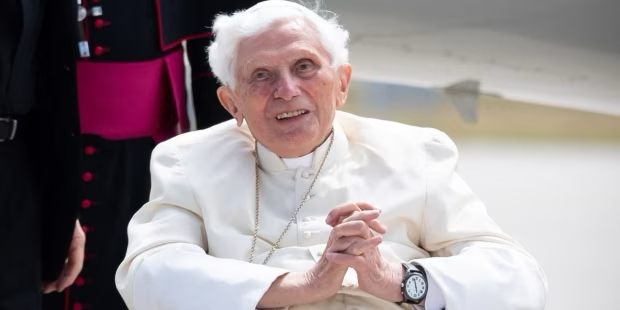priest
-
Why this hatred of authority?

Authority resembles those secret agents dear to Graham Greene who conceal their identity so as not to lose it further during a bad encounter. It still has a few admirers who are fond of it and deploy treasures of ingenuity to define it, redefine it, so that it is understood in its time. To do this, they bring it closer to the Continue reading
-
What is the problem with the Mass of Paul VI?
More than fifty years ago, the Catholic Church adopted a new Mass that broke with Church tradition in an unprecedented way. The reformers, however, had not anticipated that the traditional Mass would outlive them. They were even convinced of the opposite. And they used every means at their disposal to... Continue reading
-
Letter to Pope Francis regarding the Mass
Preamble This letter to Pope Francis was first written for The Roman Way 1 to bear witness to the beauty and efficacy of the traditional Roman rite and to bear witness to the shock caused by the motu proprio, Traditionis custodes, published on July 16, 2021 by Pope Francis. Holy Father, I was extricating myself from a terrible Continue reading
-
Benedict XVI in Paradise!

—Is it morning or evening? My breath stopped, then started again. As if it were giving signs of a defect. It was leaving me. The pneuma was leaving me. I breathed that I was ready. My God, how I love it! But, the breath returned, as if it had gone out on an errand. The memores is out. Continue reading
-
Craftsman's Prayer
12th Century Monastic Prayer Teach me, Lord, to use well the time You give me to work… Teach me to unite haste and slowness, serenity and fervor, zeal and peace. Help me at the beginning of the work. Help me in the heart of the labor… And above all, fill the gaps in my work Yourself. Continue reading
-
News from Ernest Hello about fear and its perfections
Fear in general, then, has perfections that evil does not. Perhaps the crucifixion was felt in a more terrible way in the Garden of Olives than on the cross. For on the cross, it was felt in reality. In the Garden of Olives, it was felt in spirit. Continue reading
-
Antigone, rebellious and intimate (2/7. The funeral)
Part 2: The Funeral — "My dearest Ismene. I came this morning to tell you that I took care of everything. I used the same funeral directors for our two brothers. I couldn't choose, and since our brothers didn't leave any last wishes, I took matters into my own hands to Continue reading
Antigone , counter-revolution , ethics , history , intimacy , death , forgiveness , priest , religion , revolution -
Antigone, rebellious and intimate (1/7. The family)
Part 1: The Family From the first reading of Antigone, an ambiguity sets in in the reader's mind. Does Antigone embody action or reaction? What moves Antigone? Reaction never exists by itself, whereas action needs no one; it legitimizes itself in the act. Action always inaugurates something. Unlike what is often Continue reading
Antigone , Charles Maurras , counter-revolution , ethics , history , intimacy , forgiveness , priest , religion , revolution -
Which saints to turn ?
The Marcial Maciel affair forces us to ask the question of Evil. Our era avoids dealing with it. What do we know about the devil's work, and what can we do to protect ourselves from it? After trying to hide the good in life, should we be surprised that evil is coming to light? The works of the devil are Continue reading
-
The abandonment of Benedict XVI
"Eli, Eli lama sabachthani?" 1 When Benedict XVI signifies, in a few simple words, that he is renouncing the office of Pope, it is an earthquake that shakes the world and strikes Catholics. The most outlandish rumors are circulating and everyone is wondering about the causes of this decision which, even if it Continue reading
-
Christian testimony
When I started this blog, the idea of writing about the liturgy quickly came to me. Not to claim expert status, but to share my experience about what represents the heart of a Christian's life. So there were two paths that had to merge: I had to tell the Continue reading
-
A year that ends...
As the year draws to a close, we often take a furtive look back. Don't linger too long. You never know how many things you've forced yourself to bury might reappear, like those impromptu, rude, and irritating pop-ups on the internet. The exercise you can do is to Continue reading
Bernanos , stupidity , Catholicism , Ernesto Sabato , ethics , literature , politically correct , priest , religion -
Monsignor Centene...
The people of Vannes are well-off. Monsignor Centène's homily at Saint-Pierre Cathedral in Vannes last Sunday was a welcome change. This isn't the first time Monsignor Centène's homilies have been cited on Catholic websites, and given their quality, it's not likely to end soon. Continue reading
-
Priest "Generation Benoit XVI"
Dear Father, It is with great pleasure that I bid you farewell. Not because I am happy that you are leaving the Chapel of Our Lady of the Lily, but because I am happy to have met you and that you are continuing your priesthood by showing the example of the priest according to Benedict XVI. Yesterday, for the feast of the Continue reading